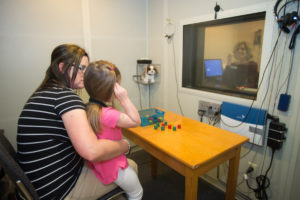How common is hearing loss?
Hearing loss is a very common problem. About 10% of the U.S. population has hearing loss. 30% of people over age 60 have hearing loss and nearly half of those over 75 have hearing loss. 15% of those from ages 41 to 59 have hearing loss. 7% of those from ages 29 to 40 already have hearing loss. Six of every 1000 babies are born with hearing loss and 10 to 15% of those babies pass their newborn hearing screening. Therefore, it is important to refer a baby for a hearing evaluation if there are concerns even if they have passed their newborn hearing screening.
What is an audiological evaluation?
 The audiologist checks the ears for any obstruction such as earwax, then performs testing to determine the degree of hearing loss for low, mid, and high pitches. Testing is used to determine where in the ear the hearing loss occurs. Speech testing is completed to determine understanding of words once they are loud enough. Appropriate treatment or referrals are recommended. Babies and children are tested with special techniques appropriate for their age, such as watching babies localize to sounds given through calibrated speakers, or teaching young children to drop a block in a bucket when they hear the sound. Young babies are tested using auditory brainstem response (ABR) and otoacoustic emission (OAE) testing, where the baby’s responses are measured using electrodes placed on different parts of the baby’s head for ABR testing, and by measuring echoes to the sounds in the baby’s ear for OAE testing.
The audiologist checks the ears for any obstruction such as earwax, then performs testing to determine the degree of hearing loss for low, mid, and high pitches. Testing is used to determine where in the ear the hearing loss occurs. Speech testing is completed to determine understanding of words once they are loud enough. Appropriate treatment or referrals are recommended. Babies and children are tested with special techniques appropriate for their age, such as watching babies localize to sounds given through calibrated speakers, or teaching young children to drop a block in a bucket when they hear the sound. Young babies are tested using auditory brainstem response (ABR) and otoacoustic emission (OAE) testing, where the baby’s responses are measured using electrodes placed on different parts of the baby’s head for ABR testing, and by measuring echoes to the sounds in the baby’s ear for OAE testing.
Why should I be concerned about a mild hearing loss?
Even mild hearing losses affect the ability to hear the soft consonant sounds in speech, making speech sound muffled. Children with mild hearing loss or unilateral hearing loss are at risk for speech delay and academic failure.
Do people wear hearing aids every day?
Hearing aids take time and patience to use successfully. Individuals who obtain the most benefit from their hearing aids wear them consistently every day which helps them adjust to the aids more quickly. Your audiologist will take your experience with hearing aids into account when programming the aids and then gradually tune the aids to the recommended settings as you get used to the sounds. Children with hearing loss need to wear their hearing aids during all waking hours. Full-time use is needed to develop normal auditory and communication skills.
Will I become dependent on hearing aids?
Those who wear hearing aids consistently get used to hearing all of the sounds in their environment and miss those sounds and parts of speech when not wearing the hearing aids. However, no actual physical changes occur to the hearing acuity, and hearing aid use will not prevent further decline in hearing.
What will happen if I delay getting hearing aids? Will anything deteriorate by waiting as long as possible?
It is much easier to adjust to hearing aids if the hearing loss is mild and short-lived. Untreated hearing loss is related to increased dementia, increased depression and anxiety, and withdrawal from social activities. Use of hearing aids improves relationships with family members, self-confidence, and social life, so it is important to seek help as soon as the problem is identified.
I have tinnitus. Will hearing aids make my tinnitus worse?
Hearing aids are usually quite helpful in treating tinnitus, by selectively amplifying environmental sounds, usually in the frequencies where the tinnitus is heard. This in turn makes the tinnitus harder to hear. Some patients with severe tinnitus need to be treated with a more intensive program called Tinnitus Retraining Therapy.



